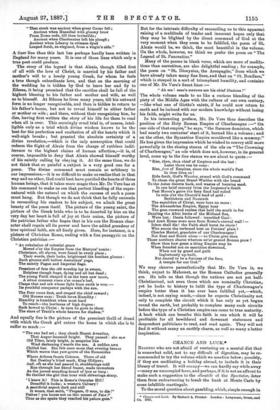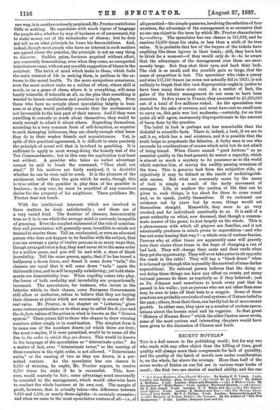CHANCE AND LUCK:.
READERS who are not afraid of venturing on a mental diet that is somewhat solid, not to say difficult of digestion, may be re. commended to try the volume which we mention below; possibly, if they are meditating a holiday abroad, to include it in their library of travel. It will occupy—we can hardly say while away —many an unoccupied hour, and perhaps, if it is not an affront to make each a suggestion to the clientele of the Spectator, deter them from endeavouring to break the bank at Monte Carlo by some infallible martingale.
To the moral question about gambling, which, simple enough in • Chaste and Luck. By Richard A. Proctor. London Longman, Green, sad Co. Ik737. one way,is in another curiously perplexed,Mr. Proctor contributes little or nothing. He reprobates with much vigour of language the people who, whether by way of business or of amusement, try to make money out of the vicissitudes of chance; but he does not tell as on what principle he bases his denunciations. And, indeed, though most people who have an interest in such matters are agreed about the practice, the principle is not an easy thing to discover. Sadden gains, fortunes acquired without effort, are commonly demoralising, even when they come, as unexpected inheritances come, without any possible suggestion of blame in the recipient. The habit of mind which looks to them, which finds the main interest of life in seeking them, is perilous in the ex- treme to the moral health. To the more scrupulous conscience, even the most modest stake on a rubber of whist, where skill is much, or on a game of chess, where it is everything, will seem barely tolerable, if tolerable at all, on the plea that something is wanted to insure carefulness and precision in the player. Even those who have no scruple about speculating largely in big- ness or at play, would probably concede that the excitement is not favourable to the best part of their nature. And if they were unwilling to concede so much about themselves, they would be ready enough to admit it about others. Regarding themselves, according to a very common form of self-deception, as superior to such damaging influences, they see clearly enough what harm they do to their weaker friends and acquaintances. Yet, in spite of this practical agreement, it is difficult to state precisely the principle of moral evil that is involved in gambling. It is sufficient to apply to most wrong-doing the homely teat of the Ten Commandments ; but in this case the application is at least not evident. A gambler who takes no unfair advantage cannot be said to break the command, "Thou shalt not steal." If his motives are fairly analysed, it is doubtful whether he can be even said to covet. It is the pleasure of the excitement rather than the gain which he seeks, though this is true rather of the gambler in play than of the gambler in business ; in any case, he must be acquitted of any conscious desire for the property of his neighbour. These problems Mr. Proctor does not touch.
With the intellectual interests which are involved in these matters he deals satisfactorily ; and these are of a very varied kind. The doctrine of chances, demonstrably true as it is, is one which the average mind is curiously incapable of grasping. Even the simplest statement of the rule of combina- tion and permutation will generally seem incredible to minds not trained to receive them. Tell an uneducated, or even an educated person who does not happen to be familiar with the en bject, that you can arrange a party of twelve persons in so many ways that, though arranged twice a day, they need never sit in the name order for a million years, and you will be met with a stare of blank incredulity. Tell the same person, again, that if he has tossed a halfpenny a dozen times, and found it come down "tails," the chances are equal that it will come down " tails " again the thirteenth time, and he will be equally unbelieving; yet both state- ments are demonstrably true. When cupidity comes into play, the forces of both credulity and incredulity are proportionally increased. The speculators, for instance, who invest in the lotteries which, to their shame, some European Governments still allow or authorise, refuse to believe that they are buying their chances at prices which are enormously in excess of their real value. Mr. Proctor, in his chapter on "Lotteries," gives some curious particulars as to what may be called the de jure and the de facto values of the prizes in what is known as the " Geneva system." These prizes fall to those who chance to draw winning numbers either singly or in combination. The simplest form is to name one of the numbers drawn (of which there are five); the most complex, if it were permitted, would be to name all the five in the order in which they are drawn. This would be known in the language of the speculation as "determinate quiue." As a matter of fact, even "determinate terne," or the naming of three numbers in the right order, is not allowed. "Determinate ambe," or the naming of two as they are drawn, is a per- mitted venture. As the speculator has one chance in 8,010 of winning, he ought, Mr. Proctor argues, to receive
8,010 times his stake if he is successful. This, how- ever, would scarcely be fair; some advantage must necessarily be conceded to the management, which would otherwise have to conduct the whole business at its own cost. The margin of profit, however, that is actually taken—the difference between 8,010 and 5,100, or nearly three-eighths—is certainly excessive ; and when we come to the most speculative venture of all—i.e., of all permitted—the simple quaterne, involving the selection of four numbers, the advantage of the management is so excessive that no one can object to the term by which Mr. Proctor characterises it,—robbery. The speculator has one chance in 511,038, and he receives 75,000 times his stake, or less than a sixth of its true value. It is probable that few of the buyers of the tickets have anything like these figures in their heads; still, they have but to think for a moment—if they would only do it—to be aware that the advantages of the management over them are enor- mously large. Bat they shut their eyes, and back their lack. The risk is so small, and the possible gain so large, that the sense of proportion is lost. The speculator who risks a penny and wins 131,150 francs (as some one actually did in 1821), is not unlikely to forget that this vast disproportion ought in justice to have been many times more vast. As a matter of fact, the gains of the lottery management do not seem to have been excessive. In five years in France, they amounted to £1,210,000 out of a total of five millions risked. As the speculation was started for the sake of revenue, and must have cost no small sum to carry on, this gain was but moderate,—certainly, for on this point all will agree, enormously disproportionate to the amount of harm done by the practice.
The belief in lack is perhaps not less remarkable than the disbelief in scientific facts. There is, indeed, a lack, if we are to call it so, which has a real existence, and it is possible that the truth helps to perpetuate the delusion. A lucky man is one who succeeds by combinations of causes which exist but do not admit of being traced. When Cicero named "good fortune" as an essential quality in the best general, he meant a capacity, which is almost as much a mystery to its possessor as to the world which watches him, of seizing the swiftly passing occasions of the time. This is genuine luck from the subjective side, as objectively it may be defined as the result of undistinguish- able causes. But what we commonly mean by the name of luck is simply a result of the tardy movement of averages. Life, or anyhow the portion of life that can be given to such things, is too short for them to come round and, so to speak, justify themselves. If we reckoned our existence not by years but by mons, things would set themselves straight. Meanwhile, they seem to go very crooked, and for individuals practically do so. It is said of a great authority on whist, now deceased, that though a consum- mate master of the game, he Jost largely on the whole. This is a phenomenon with which all players are familiar, and it not unnaturally produces in minds prone to superstition—and who has not some leaning that way 1,—a whole crop of curious fancies. Persons who at other times are apparently sane will gravely turn their chairs three times in the hope of changing a run of bad lack. They will change their seats and their cards when they get the opportunity. They will even take pains to sit opposite the crack in the table! They will tap a "black deuce" when it is turned up (though this is possibly the survival of some darker superstition). No rational person believes that the doing or not doing these things can have any effect on events, yet many rational persons do them as regularly as if they believed ; jest as Dr. Johnson used sometimes to touch every post that he passed in his walks; just as persons who are not other than sane may be seen to take off their hats to a magpie. Some of these practices are probably survivals of real systems of Nature-belief in the past ; others, from their form, can hardly but be of more recent growth. In either case, they open up a number of carious specu- lations about the human mind and its vagaries. In that great "History of Human Error" which the elder Caxton never wrote, some of the most curious and interesting chapters would have been given to the discussion of Chance and Luck.



































 Previous page
Previous page